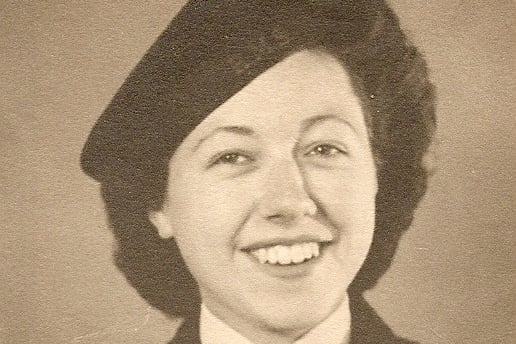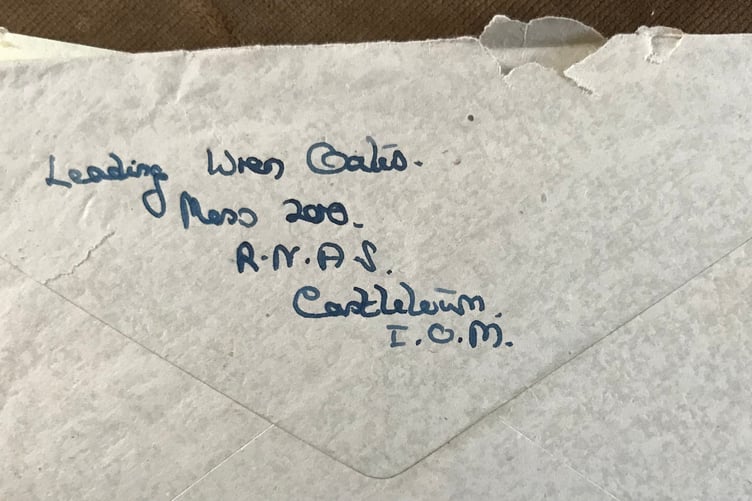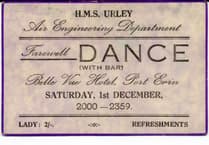In the summer of 1944, Wren Kathleen Oates was stationed on the Isle of Man, writing dozens of letters home about life and operations at Ronaldsway. Eighty years later, her daughter, Christine Smith, explores these letters in a series of columns based on Kathleen’s wartime experiences...
Eighty years ago this week, Wren Kathleen Oates had returned from her short VE Day leave, and reported home that her return journey from Leicester had been a smooth one. ‘My journey here wasn’t at all bad. I slept most of the way up to Manchester. We ran well to time – I had about 40 minutes’ wait in Sheffield, where I had a cup of tea. There was a Services bus at Manchester to take us across to Victoria so that was no effort. I had a good breakfast in Fleetwood at the canteen – fried tomatoes on fried bread, bread and butter and marmalade – also a good wash, after which I felt considerably better. The ship was the Viking again and she was packed with holidaymakers. It wasn’t a particularly sunny crossing so I decided to go below and sleep as I felt very tired. There are bunks in the third class lounge, so making a pillow of my Mac, I lay down and slept pretty well. It was a good crossing – we didn’t sail till after 12 o’clock and we were in Douglas harbour by 3:20pm.’
But there was more important news to impart, in case the family hadn’t noticed the clue on the back of the envelope. ‘If you have looked at the back of the envelope, you will all have noticed my most important piece of news – yes, I’m now a Leading Wren and wear on my arm one of those nice little anchors which you’ve admired so many times, Mum. It was the first news to greet me when I arrived in camp last night. The Regulatory Petty Officer said “report with ‘Captain’s Requestion’ tomorrow morning at 11.0 o’clock – you’re to be rated up”! You can guess how surprised I was – but I feel I deserve it! Both Cynthia and I have been rated up. We had to go in front of the Captain this morning – quite a little ceremony – then we cycled straight back to clothing stores to collect our hooks.’ ‘Hooks’ was presumably Naval slang to describe the anchor insignia worn on the arm of the Wren uniform.
Practical as ever, Kathleen went on to consider the implications of the promotion and what her higher salary would mean. ‘I think my pay will increase by 10/- per fortnight, but I’m not certain of the exact amount. The promotion is dated back to April, so I shall get a little back pay. On this base, Leading Wrens aren’t allowed any extra late passes, but we can stay out till 10:45 every night instead of 10:30 (huge concession – I don’t think!!). However, it’s definitely worth having - a little more prestige at least! Cynthia and I have authority in the cabin – saying when the lights have to go out and noise to cease, etc. – but we shall have to be very diplomatic in that direction. Normally when one gets any promotion – one also gets a draft – but I don’t think I shall in this case. I think the hook has been awarded for the job. Lieutenant Commander Wellington (the one whom I had the argument with) recommended us.’

On July 16, father Chris replied, congratulating her and joking. ‘Yes we all felt thrilled – guess you are also. The best bit of course for you is this five shilling increase and retrospective to April – expect next time you are on leave you’ll quietly say, “put your hand up Pop – here’s a shilling “!’
Unfortunately, there had been a misunderstanding over additional pay. A later letter that week regretfully announced that ‘the extra pay isn’t so much – 3/6d per week only. However, it’s better than nothing. Payday is next Thursday so I’ll let you know how much back pay I get.’
At odds with the news of her promotion, other elements in Kathleen’s letters that week, had a whiff of insubordination around them. On Saturday 14th, about a dozen girls, including four Officers, went strawberry picking ‘We were able to eat quite a few when the Second Officer wasn’t looking! They’d been sadly neglected for want of labour I expect – lots had rotted without ever having been picked. Sunday lunchtime, we each had 10 strawberries so we didn’t do too badly. I believe they were three shillings a pound.’
She also mentioned that one of the Janes had been able to go on a week’s leave, presumably without official permission, ‘because other Wrens worked her shifts for her, without any Officer being aware of this’. There must have been a general feeling that Jane had been treated unfairly for this to happen.
On the evening of July 20, Kathleen went to the cinema with the two Janes and Cynthia. ‘The newsreel was most interesting – it showed the Japanese suicide squads attacking the Bunker Hill [a US aircraft carrier] and other carriers. I think we little realise the immensity of the Naval battles which are being fought out there. It certainly wasn’t very encouraging for the FAA [Fleet Air Arm] aircrew who were watching, to see pilots trapped in burning planes, kites landing and going straight over the edge [of the aircraft carrier] again.’ Unlike most of the British population, the War was a very present reality for Ronaldsway personnel.
However, Kathleen had heard from Dora, a former colleague in Liverpool, whose Naval Base would shortly be closing down; this prompted her to worry yet again about her future after Ronaldsway. ‘I met the School Master going out of the camp gates and told him I’d like a few words with him sometime about the Civil Service – I can’t make up my mind whether it would be better than teaching or not. - What a problem one’s post war life will be!’




